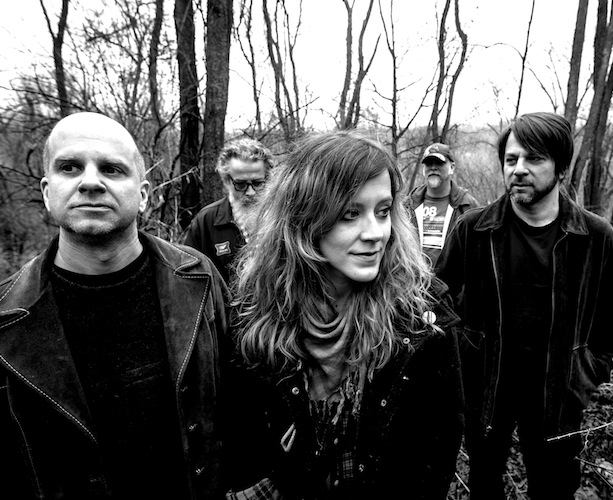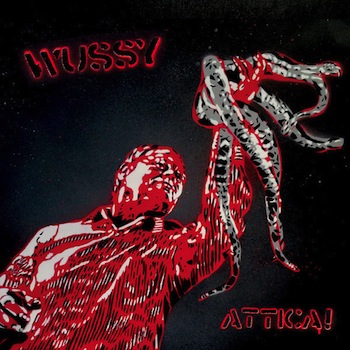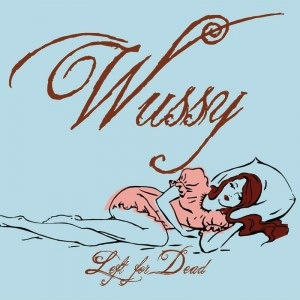Music Interview: “I Can’t Admit Defeat” — Wussy Carries On
“Music is kind of like a religion in a way, and your heroes become your patron saints.”
By Jeff Melnick
The band Wussy has been steadily making critically-acclaimed records since their debut in 2005, but they haven’t played in the greater Boston area since a Somerville performance in 2009. Thus the sold-out show at the Midway Café in Jamaica Plain this Friday offers a rare opportunity to hear a group (featuring co-lead singers Lisa Walker and Chuck Cleaver) that has a strong claim to being the most consistently exciting American rock and roll band of the 21st Century. Don’t just believe me: their most important champion has been veteran rock critic Robert Christgau, who has endorsed the band again and again in delirioiusly positive evaluations of their major releases: Funeral Dress, Left for Dead, Wussy, Funeral Dress II, Strawberry, and this year’s Attica!. The new record has earned them (finally) attention in Pitchfork and Spin. Attica! has been particularly well-received by critics: along with Christgau, notices by Jason Gubbels and Michael Tatum are particularly worth reading.
Wussy’s music is dark and thrilling: it is hard to think of a band at once so willing to stare down the challenges of middle age and pay such careful respect to the complex world of the American teenager. Their young folks resemble the two girls at the heart of Ohio compatriot Jo Ann Beard’s novel In Zanesville (2011); the kids are aware of the high stake realities of daily life — as in “Halloween” when Lisa Walker sings of being “14 at the fair/declaring things I’d never been” — but not always able to control things around them. Beard’s narrative opens with a line that would not be out of place in a Wussy song: “We can’t believe the house is on fire. It’s so embarrassing first of all, and so dangerous second of all.”
Attica! starts off with “Teenage Wasteland” and offers an unironic paean to the Who’s “Baba O’Riley.” Wussy redeems the idea of ‘Teenage Wasteland,’ a topic that could so easily have become a cliché. That might be Wussy’s most effective calling card — their ability to skate right on that edge, making use of familiar musical and lyrical formulations but somehow still coming up with something revelatory. “Don’t Leave Just Now,” the devastating last song on their first record, offers one of the best examples of the band’s alchemy. Those magic (C-Am-F-G7) rock and roll changes construct a scaffolding for one of the saddest songs of romantic loss in recent memory. “Accuweather calls the rain,” Cleaver sings, “its falling on the little things you love the most”; the song is equally heartbreaking if the “little things” are children or garden trolls.
It is heartening that the band sold out the Midway so long in advance of the show. As Tatum notes in his review of Attica!, it has become something of an “existential joke” that this band’s albums are “celebrated by their enamored clique while the rest of the world once again fails to take notice.” Attention is now being paid to Wussy (Cleaver and Walker, along with Mark Messerly, Joe Klug, and John Erhardt). The band graciously answered my questions via e-mail in between shows.
The Arts Fuse Can we start with death? The first song on your first record features a tombstone; the next song — the title song — is called “Funeral Dress.” This is followed by a song which seems to be about a suicide. Your next record was called Left for Dead. The title track of the new record — a song based on Sidney Lumet’s film Dog Day Afternoon — has the protagonist thinking about his impending death.
Lisa Walker and Chuck Cleaver: I really don’t think we obsess about it any more than anyone else. Unless people really don’t think about it at all, and that seems improbable. As far as using it as a reference point, it just feels kind of normal. In art, how many powerful universal metaphors do you get besides that? A couple dozen? Gotta go with the classics.
Arts Fuse: I won’t be the first one to point out that Wussy is especially interested in — and good at — writing songs which require that listeners know other songs. Attica! opens with “Teenage Wasteland.” Can you talk a little bit about how you carry other people’s music with you as you write songs, figure out vocal arrangements, play solos, organize your live set and so on?
Walker and Cleaver: Well, artists would be nowhere without their influences. As for the nods, we write for ourselves first and foremost. If others pick up on the references, that’s even better! But it’s just our way of paying homage to the many greats that have gone before us. Music is kind of like a religion in a way, and your heroes become your patron saints. Instead of painting a picture of St. Francis, you’re slipping Neil Young into a lyric. It’s not such a stretch. Vocal arrangements are all ours, but there are many years of influences working in our subconscious. Solos are mostly accidental. Live sets are just a nice flow of what works (of the songs we remember).

Lisa Walker, Chuck Cleaver, and the rest of Wussy (Mark Messerly, Joe Klug, and John Erhardt). Photo: Sean Hughes
Arts Fuse: Could you each pick a song from Attica! and talk a little bit about how it matters to your sense of the band’s work? What does this song do that you needed Wussy to create it at this moment?
Cleaver: It’s hard to pick a single song. We don’t really talk a whole lot about this stuff. We just do it and figure it out as we go. As a whole, we wanted to make a record that was more immediate… more live… and we managed that. Every record could be the last. The aim is not to suck. And we’ve accomplished that so far.
Walker: I think I would pick “Home.” Just because we got to do a lot of fun stuff that almost doesn’t seem like anything we’ve done previously. Chuck’s right – we got the opportunity to do a lot of loud, live sounding tracks – on the first three songs especially. But I really enjoyed getting to spend time in the studio on that middle section. Joe’s synths really make it come alive. I got to play vibes and e-bow on some things and that was super fun, too. We layered it so much, we can’t play it all live yet. It’s the next phase in our development.
Arts Fuse: Can you talk about what it means to be a band from Cincinnati? Whether it’s the music scene you inhabit or the landscape in and around the city, what about Cincinnati (or Southern Ohio) might we hear in your music?
Cleaver: It used to mean being satisfied with keeping a low profile, because Cincinnati was never exactly a hotbed. Now, with the internet and such, you can pretty much be from anywhere. It’s said that you should write what you know, so I’d hope that where we’re from shows up in what we do. It’s not like we write about elves and fairies and shit.
Walker: But if we were from Iceland, I guess we would. Yeah, we definitely tend to write about the things we see around us. Cincinnati has a pretty big music scene. But you can also exist quietly and do your own thing, while living comfortably for very little. It’s nice that way. We have a rich musical history here, and the King Records influence lives on in most of the bands that record here.
Arts Fuse: The name of Cleaver’s last band was the Ass Ponys. On some level it seems clear that, starting with the name of the band, you don’t necessarily want to make fans feel comfortable right off the bat. Do you have thoughts about what you want to accomplish with the band outside of the important business of having fun?
Cleaver: Fun is a relative term. Some people are much more weirded out about the band name than we are. It’s a word that looks good on a t-shirt. We use it as a filter. If folks have a problem with the name, they most likely won’t like us anyway.
Walker: Even though our styles of music differ, somehow I’d like to think we have more in common with bands like Fucked Up and Diarrhea Planet than, say, The Civil Wars. Anyway, who cares what we’re called? Band names just happen by chance unless you’re overwrought.
Arts Fuse: Will you talk a little bit about the difference between putting a record together and putting a set list together? What are your main concerns (outside the obvious demands of promoting a new record) when you are figuring out, as a band, what will work best live? Do you have any songs which have proven completely intractable when it comes to sorting out a live arrangement?
Cleaver: There are always songs we can’t play from each record, but luckily we can successfully play most of Attica!. Set lists are a lot like a mix tape. You just have to arrange the songs in an order that makes sense.
Walker: It’s usually pretty apparent for us which songs work live and which don’t. Luckily, we have a lot to choose from.
Arts Fuse: Do you feel you have a peer group you are operating with in making music right now? There was a brief moment in the 1990s when the Ass Ponys got taken in under the alt-country/Americana umbrella but Wussy seems far from that. Are there other folks out there making music who you feel particularly connected to?
Walker: We’ve been really fortunate to have gotten to play with some bands that are really great and full of sweet people. Lucky for us, their styles are all over the map. Musically, I feel most connected to bands from the 60’s and 70’s. We’re not really part of a movement that I know of.
Arts Fuse: We started with death and I’m wondering if we could finish with the passage of time. While this isn’t a new theme for the band, Attica! seems particularly interested (in “Teenage Wasteland,” in “Halloween,” and in “Beautiful,” the latter perhaps most of all) in exploring what it means not to be young anymore. There is a great deal of loss built into these songs. Can you talk a little bit about how the band thinks about its own aging process?
Walker: We exist and work in the moment. If we thought that analytically about things, we’d be in a different line of work.
Jeff Melnick teaches American cultural history at University of Massachusetts Boston. His most recent book, 9/11 Culture: America Under Construction (2009) was recently translated into Arabic. Currently, Melnick is researching a book to be called Creepy Crawling with the Manson Family.


